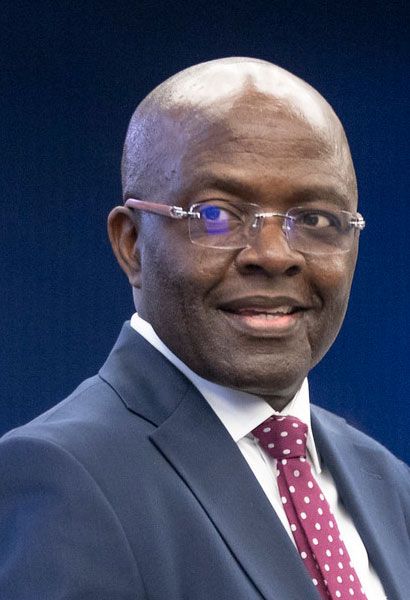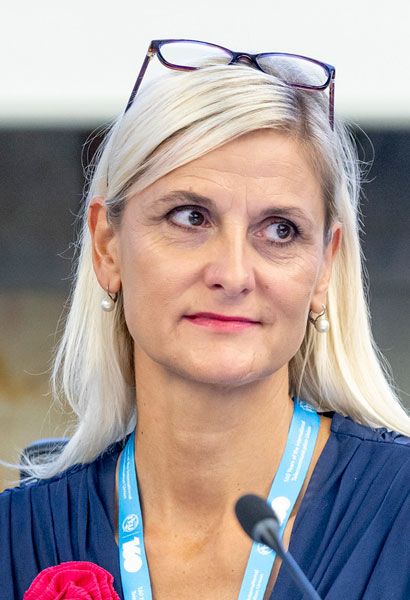
Digital statistics for global development
The World Telecommunication/ICT Indicators Symposium (WTIS) has become the world’s primary forum on digital development statistics, offering a unique platform to debate key questions on digital policy and data. Following the 20th edition, Cosmas Luckyson Zavazava, Director of the Telecommunication Development Bureau at ITU, and Apolonija Oblak Flander, Director-General of the Statistical Office of Slovenia and Chair of WTIS-25, discuss the importance of investing in data and the evolution of information and communication technology (ICT) statistics.
Firstly, Dr Zavazava, how has WTIS evolved, and what lessons have been learned over the years?

Zavazava: Since 1996, we have hosted 20 editions of WTIS. The event has been a powerful advocacy tool. By keeping ICT statistics on the global agenda, WTIS reminds policymakers and development partners that investing in data is essential for the design of effective digital strategies that ensure no one is left behind.
But the digital world has changed dramatically since the first edition of WTIS – particularly how digital access and engagement are measured. In the 1990s, only a fraction of the population had Internet access, mobile phones were basic, and data collection was limited. Today, digital technologies advance at lightning speed, and measurement must adapt in step. WTIS provides a platform where new ideas and approaches can be shared, helping countries keep pace with changing realities and ensuring that statistical systems remain relevant and useful.
WTIS also shapes the activities of ITU’s Expert Groups on Telecommunication/ICT Indicators and on ICT Household Indicators (EGH), whose work is essential to keep ICT statistics relevant and globally comparable. To strengthen the links between WTIS and these expert groups, we hold their annual meetings back-to-back with WTIS. This enables most members to attend WTIS first, benefit from the global dialogue, and then carry those insights into their own sessions, where they set priorities for the year ahead.
Now Ms Oblak Flander, from your perspective as head of a national statistical office, why is investing in tech-related data collection so crucial to achieve universal and meaningful connectivity and advance digital transformation?

Oblak Flander: The core mission of national statistical offices is to collect high-quality, reliable, and comparable data across various domains, based on high professional principles and values. The resulting statistics serve as the foundation for evidence-based decisions and strategies that affect all areas of society, the economy, and environmental management.
As digitalization expands, new challenges arise, such as the need for data on digital skills, safe technology usage, and privacy protection. To provide Internet access for all, foster digital literacy, and prevent digital divides, decision-makers need robust and high-quality ICT data.
Given that countries differ in their level of digitalization, the statistical community must ensure that data are comparable – over time and among countries. International organisations such as ITU play a key role by developing methodologies and facilitating knowledge exchange among statisticians worldwide.
I believe that with the right and high-quality data, policymakers can make informed decisions that support universal and meaningful connectivity – the ability for everyone to enjoy a safe, enriching, productive, and affordable online experience that is both empowering and inclusive.
Digitalization is rapidly reshaping many areas of life. Only with appropriate data can we understand the impact of digitalization on employment, productivity, future workforce needs, economic transformation, health, energy consumption, and pressures on natural resources. Even if national statistical systems face challenges, they must adapt to a fast-changing world and collect data that go beyond the usage and impacts of emerging technologies.
National statistical systems will continue to support digitalisation by monitoring changes over time and across regions. This monitoring aims to keep pace with technological developments and their impacts on society, the economy, and the environment.
From both of your perspectives, how can the latest edition of the symposium, WTIS-25, help address today’s digital development challenges?
Zavazava: WTIS-25 is particularly timely to help monitor some emerging issues. Two stand out right now: the use of artificial intelligence (AI) and digital initiatives to strengthen people’s health and well-being. Both are shaping societies at lightning speed, yet the associated measurement frameworks are still in their infancy. WTIS provides the platform to draw global attention to these challenges and showcase promising efforts at the local level that could be scaled up internationally.
Another focus this year is the financing of statistics. No data without money. ITU has carried this message to the G20, where we serve as a knowledge partner. In today’s challenging global context, as we press on to realize the UN Sustainable Development Goals, we must ensure that investment in statistics is recognised as an essential component to address socio-economic development challenges. Dedicating even a fraction of financing to measurement pays dividends by enabling evidence-based policy.
WTIS-25 also connects directly to the Global Digital Compact adopted at the UN General Assembly in 2024, which recognizes the importance of universal and meaningful connectivity as well as the need to invest in data ecosystems, including through digital inclusion surveys.
WTIS has further amplified this call to action. Indeed, there was a session with the members of the Partnership on Measuring ICT for Development – a coalition of 14 international organizations that is currently mapping commitments under the Global Digital Compact and Action Lines based on the World Summit of the Information Society (WSIS) against existing indicators.
In addition, WTIS-25 featured a session on the use of mobile phone data for statistics, highlighting the importance of leveraging new data sources to measure digital development and give countries more timely and granular information to guide policy decisions. The role of regulators is central here: by facilitating secure, trusted, and responsible access to mobile operator data, they can help unlock its potential for official statistics while safeguarding privacy and public trust.
Oblak Flander: A key element of this global forum is the exchange of information and experiences among countries with differently developed statistical systems. As Slovenia’s representative in the European Statistical System, I recognize the value of mutual cooperation aimed at collecting relevant and, above all, comparable statistical data.
WTIS-25 faces an even greater challenge: unifying the global statistical community. Key challenges include expanding tech-related measurement to include sectors like health, labour, and government; regularly updating ICT indicators; incorporating data and promoting other data sources; maintaining alignment with the UN Sustainable Development Goals; and supporting national statistical offices through capacity-building initiatives where needed.
Looking ahead, as societies become ever more digital, further challenges are emerging in tracking the use and impact of AI, integrating AI into our statistical processes, and promoting access to alternative data sources. Insights from these WTIS sessions are key to upgrade existing methodologies and develop new ones to keep pace with rapid technological progress.
We must remain agile and alert to ensure we measure what truly matters: upholding democracy; fostering the fair societal development; strengthening economic resilience and productivity; and promoting the smart use of scarce resources to safeguard environmental sustainability.
WTIS-25, highlighting the past, present and future of digital development statistics, took place in Geneva, Switzerland, on 22-23 September 2025.
Image credit: ITU/D. Woldu
